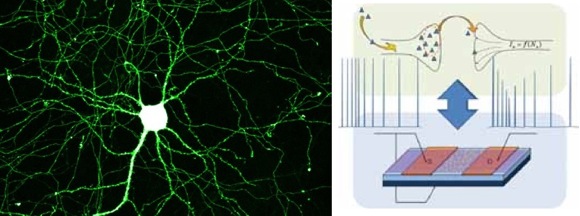
Talk of androids, advanced computer-based brain simulations and war robots is very exiting, but the development of artificial intelligence has been slightly stumped by a lack of transistors that work like our brains do. Until now.
Now, thanks to scientists in France, we have the NOMFET--the nanoparticle organic memory field-effect transistor. It's an organic-based device that uses pentacene and gold nanoparticles. The pentacene is a coating on the gold, which is embedded in the channel of a semiconducting transistor. This results in the transistor having the same type of switching/amplification behavior as a usual transistor with the benefits of a sort of "memory effect."
The upshot of this memory effect is that the NOMFET behaves in a similar way to the manner of an organic synapse as it transmits a signal between neurons--it can modify its reaction to incoming signals based on events that happened before, or on the nature of the signal it's dealing with at that moment. As a result it will allow for simplified chip-based simulations of a brain-type system, with far fewer semiconductor components than have been needed previously.
This has repercussions for neuron-inspired artificial brain designs, which may now be more densely constructed. The technology of artificial brains may be significantly boosted as a result--which means we may see better machine vision hardware. And, of course, the artificial synapses may be used to boost the artificial intelligence of the sort of robots that get sci-fi fans all hot under the collar.
Hecho Por:
Reyes Vargas Jairo Alberto
Reyes Vargas Jairo Alberto
No hay comentarios:
Publicar un comentario